Pallister frustrated by failure to resolve rail blockades
Advertisement
Read this article for free:
or
Already have an account? Log in here »
To continue reading, please subscribe:
Monthly Digital Subscription
$0 for the first 4 weeks*
- Enjoy unlimited reading on winnipegfreepress.com
- Read the E-Edition, our digital replica newspaper
- Access News Break, our award-winning app
- Play interactive puzzles
*No charge for 4 weeks then price increases to the regular rate of $19.00 plus GST every four weeks. Offer available to new and qualified returning subscribers only. Cancel any time.
Monthly Digital Subscription
$4.75/week*
- Enjoy unlimited reading on winnipegfreepress.com
- Read the E-Edition, our digital replica newspaper
- Access News Break, our award-winning app
- Play interactive puzzles
*Billed as $19 plus GST every four weeks. Cancel any time.
To continue reading, please subscribe:
Add Free Press access to your Brandon Sun subscription for only an additional
$1 for the first 4 weeks*
*Your next subscription payment will increase by $1.00 and you will be charged $16.99 plus GST for four weeks. After four weeks, your payment will increase to $23.99 plus GST every four weeks.
Read unlimited articles for free today:
or
Already have an account? Log in here »
Hey there, time traveller!
This article was published 21/02/2020 (2126 days ago), so information in it may no longer be current.
Manitoba Premier Brian Pallister has a question for those setting up rail blockades in support of the B.C. hereditary chiefs challenging a natural-gas pipeline: “What’s your idea to make the process better?”
For more than 20 minutes in his office at the legislative building Friday, the premier vented his frustrations to reporters about the standoff that’s temporarily forced many Canadians out of work and caused untold financial losses.
Pallister called the economic consequences, “extremely damaging (and) extremely hurtful.”

He wouldn’t go as far as to advocate the forcible removal of the blockades, but he said any discussion intended to bring about a resolution to the situation must be framed properly.
“We can’t frame a discussion with people who believe that they have the right to stop everything, all of the time,” he said.
Pallister encouraged the media to ask pipeline protesters why they’re doing what they’re doing.
“What is it that you’re against? What is it that you’re for?” he said, adding Canada already has some of the most demanding approval processes for resource projects.
“Other countries don’t make consideration for Indigenous peoples at all. Other countries don’t have extensive rights of participation,” he said. “I have to ask: ‘What’s your idea to make the process better?’
“And I think, subsequently, if the answer is, ‘We don’t care about the process, we don’t know what the process is, we didn’t participate in it. We’re just here because we think that you should be able to stop this project,’ that’s a veto. And I think we have to say, no.”
The Wet’suwet’en hereditary chiefs are opposing construction of the Coastal GasLink pipeline through the First Nation’s unceded territory that would bring natural gas to a liquefaction facility and export terminal on the West Coast.
Those who are supporting the blockades on environmental grounds ignore the fact the pipeline would boost exports to Asian markets to replace coal with natural gas, Pallister said.
“That’s a significant reduction in impacts on climate change,” he said of the fuel switch.
“And if you’re advocating for Indigenous rights,” the premier added, “recognize that this entire line across Wet’suwet’en property will use less than three-10,000ths of the land that is in the Wet’suwet’en’s claimed territory.”
Pallister pointed out many in the Indigenous community in B.C. support the project, including 20 First Nation governments along the route.
“So why are you advocating for Indigenous rights on the one hand, when you’re also advocating against Indigenous advancement and equality of opportunity with jobs and social betterment on the other?” he said.
Pallister said he made several of these points during a conference call late Thursday with his fellow premiers and Prime Minister Justin Trudeau. He said he’s also addressed the issue in separate calls with Deputy Prime Minister Chrystia Freeland.
Pallister did not reveal what others said during the call. However, he said among some premiers, there’s “extreme frustration” at the situation.
larry.kusch@freepress.mb.ca

Our newsroom depends on a growing audience of readers to power our journalism. If you are not a paid reader, please consider becoming a subscriber.
Our newsroom depends on its audience of readers to power our journalism. Thank you for your support.


